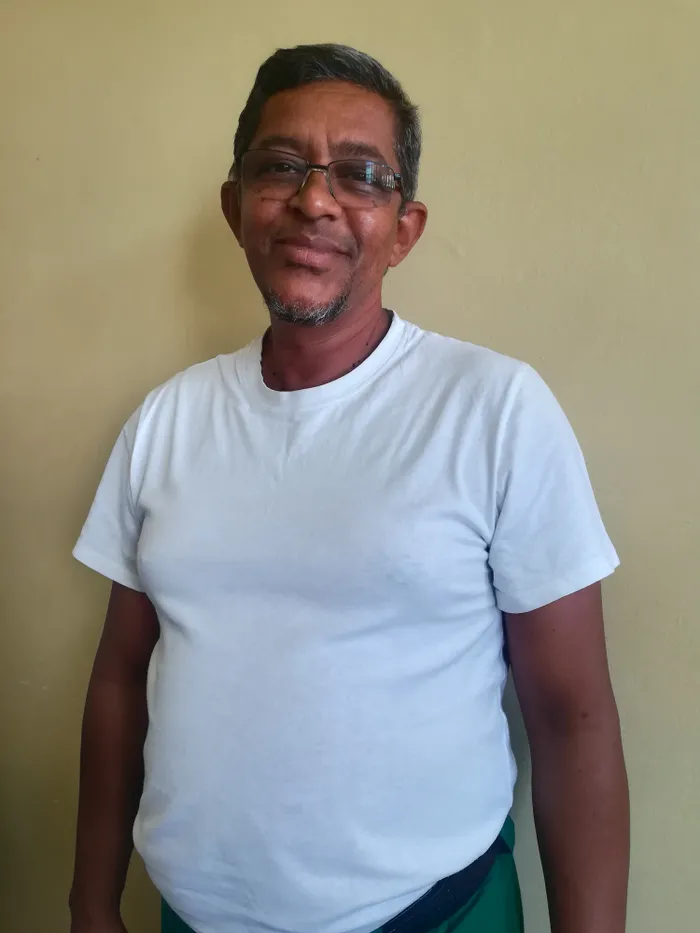Covid complicates ritual washing of Muslim dead

Yagyah Canfield, from Bonteheuwel is a toekamundie, a person who performs the ritual washing of the dead for Muslim funerals.
For more than 20 years, Yagyah Canfield and Moulana Ebrahim Lee have performed Ghusl Mayyit, the ritual washing of the dead. They speak to NABEELAH MOHEDEEN about how Covid-19 has changed Muslim funerals.
Mr Canfield is a paramedic, a commissioner of oaths, a school governing body chairman and the secretary on a Bonteheuwel mosque committee. He is also an undertaker and a washer of the dead. They are known as both ghaasils and toekamundies.
When the pandemic hit South Africa in March last year, Mr Canfield was one of two ghaasils chosen by the Muslim Judicial Council to undergo training for funerals that complied with Covid-19 safety precautions.
The peak of the pandemic, he says, was the most stressful and exhausting time of his career as regulations on how to wash someone who had died of Covid seemed to change daily.
Usually, when a Muslim dies the body is taken to the family home to be washed by the relatives under the guidance of the ghaasil and prepared for the grave. From there, the body is taken to the mosque where the Salat al-Janaaza (prayer for the dead) is recited before the procession to the cemetery.
Now the body can only be collected by the undertaker or ghaasil from the hospital - the family is excluded, apart from being asked for a picture of the deceased to ensure it is the correct corpse.
The body is taken to the ghusl (washing) room at a specific mosque, where the ghaasil, wearing protective gear, will wash the body. The family is no longer permitted to take part in this ritual. The body is wrapped in a white cotton shroud, or kafan. It is then, in compliance with Covid-19 burial regulations, also wrapped in two plastic bags and another kafan.
The body is taken by hearse to the family home. It remains in the hearse outside the home for the Salat al-Janaaza before being taken to the cemetery where the relatives, dressed in full protective gear, may assist the undertakers with the burial. This includes opening the plastic wrapping to aid the body’s decomposition.
This type of funeral costs the family R7 000 to R10 000, as opposed to the R5000 to R6000 for pre-Covid funerals, depending on their cemetery of choice, the day of the week and whether the deceased was part of a burial society.
Mr Canfield says some ghaasils still pull back the shroud from the face of the corpse for the family to greet the deceased, a ritual known as Ziyaarat, but this is not allowed unless at the hospital, mortuary or ghusl room and only then with families wearing full personal protective gear.
“This has created confusion within the community and this needs to be rectified,” he says. “We have raised this in the MJC meetings and hopefully they will address it soon. This has been an exhausting time for ghaasils as we have taken over the duties of the family members to protect them from falling ill.”
It is important for families to adhere to Covid-19 regulations, and while ghaasils still allow relatives to help with washing the deceased, he does not, he says.
“I have to concentrate on my partner and myself and make sure that we do not get the germ, so I cannot still concentrate on more people. I have to split myself to be at work, there for the community, for my family, and the sick, it is exhausting.”
He says while many people complain about the costs of the funeral under Covid-19, the full anti-germ suit alone costs R265, and you need four sets for a man and six for a woman.
Some hospitals, he says, do not allow the body bag to be opened so the ghaasil cannot check if they are taking the correct body. It is only once they reach the ghusl room that they can send a photo to the deceased’s family for verification.
“When you take the person's ID to the hospital, they look completely different to when the photo was taken when they were 16 years old, so we ask the family to send a picture of the deceased. In one case, the undertaker was given the wrong person, and the body had to be exhumed. One of our toekamundies had also contracted Covid from washing a positive Covid-19 body and that scared us,” he says.

Moulana Ebrahim Lee, from Vanguard Estate, who has been a ghaasil for more than 20 years, says different hospitals use different rules, and this confuses the community. Some allow the family to view the body with full personal protective gear on, and some don’t.
He says that in a case where family members want to be part of the washing of the body they must have full personal protective gear on and must watch from a distance, and preference is only given to the immediate family to allow for closure.
“However, many families choose not to have any interaction with the janaaza as they fear falling ill. With the women, we do encourage the family to assist,” he says because in Islam only females can wash females and there are very few female toekamundies.
“Some say that this is a more cold way of doing things, but we must protect others from falling ill. In the beginning, families insisted that the body comes into the house and emotions ran high, but we had to explain the way things must be done.”
He says if families can’t afford to pay for the funeral they don’t have to, but he urges Muslims to make provision for their deaths.